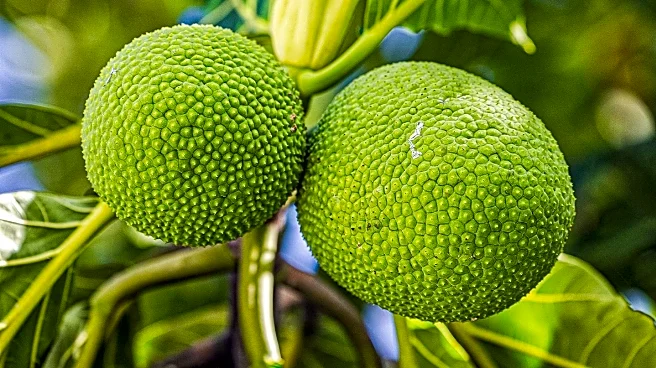What is the story about?
What's Happening?
Russell Fielding, an associate professor at Coastal Carolina University, has authored a new book titled 'Breadfruit: Three Global Journeys of a Bountiful Tree,' set to be released in December. The book delves into the historical journey of breadfruit, a plant that has spread across the globe through colonialism. Fielding's work examines the various uses of breadfruit in different regions, highlighting its significance in cultural and agricultural contexts. The book is published by Columbia University Press, and an excerpt from Chapter 3 has been shared by Hawaiʻi Public Radio. Fielding's research includes visits to experimental gardens and breadfruit farms in locations such as Guam, Maui, French Polynesia, and Ghana, where he has interacted with local experts and extension officers.
Why It's Important?
Breadfruit is a staple food in many tropical regions and has played a significant role in the agricultural and cultural development of these areas. Fielding's exploration of breadfruit's journey through colonialism provides insights into how plants can influence global trade, migration, and cultural exchange. Understanding the historical impact of breadfruit can inform current discussions on sustainable agriculture and food security, especially in regions where breadfruit is a key food source. The book's release may also spark interest in the broader implications of plant migration and its effects on societies worldwide.
What's Next?
The release of 'Breadfruit: Three Global Journeys of a Bountiful Tree' is expected to generate discussions among historians, agricultural experts, and cultural scholars about the role of breadfruit in global history. It may lead to further research into the plant's impact on food systems and cultural practices. Additionally, the book could inspire initiatives aimed at promoting breadfruit cultivation as a sustainable food source, potentially influencing agricultural policies and practices in tropical regions.
Beyond the Headlines
Fielding's work highlights the ethical and cultural dimensions of plant migration, particularly in the context of colonialism. The book may encourage readers to consider the long-term effects of colonial agricultural practices on indigenous cultures and ecosystems. It also raises questions about the preservation of traditional knowledge and the importance of respecting cultural heritage in the face of globalization.















